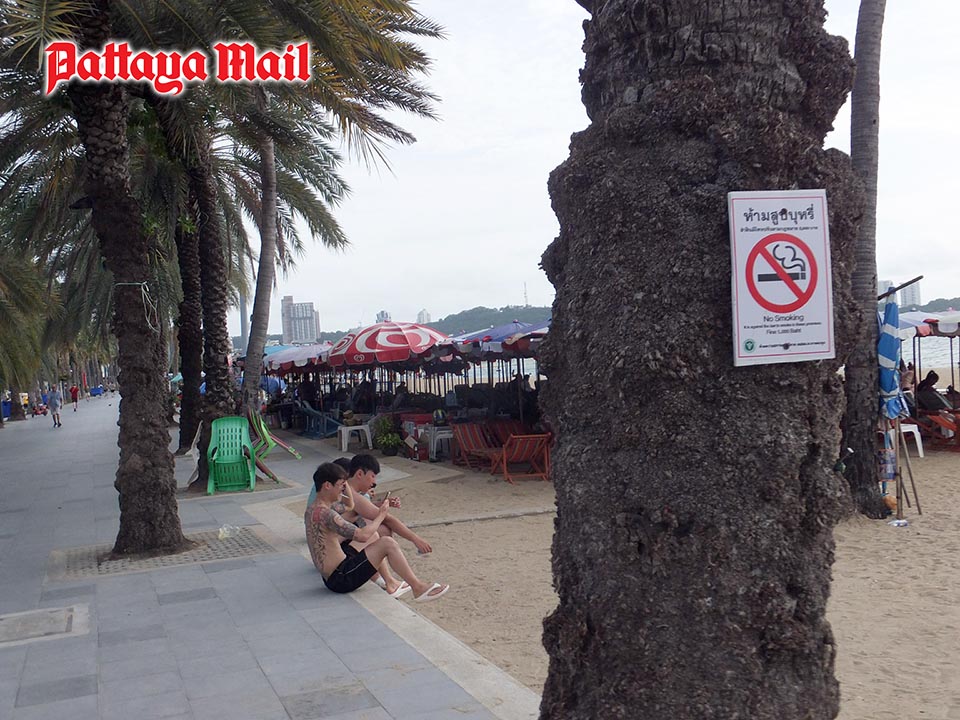Expats back smoking ban on Pattaya Beach but demand fairness and more restrooms
Pattaya’s beach smoking crackdown wins cautious support — as long as enforcement applies equally to locals and tourists. (Photo by Jetsada Homklin)
PATTAYA, Thailand – A recent crackdown on smoking at Pattaya’s beaches and footpaths has sparked a wave of reactions from local expats and long-term visitors. While many say they support a cleaner, smoke-free shoreline, others are raising concerns over how the ban is being enforced — and whether it’s yet another poorly thought-out move that could further damage the city’s dwindling appeal to tourists.
The new rule imposes a 5,000 baht fine on anyone caught smoking on the beach or nearby footpaths. On paper, it’s aimed at protecting the environment and improving public health. But in practice, many wonder if officials will actually enforce the ban or just issue warnings and move on, reflecting a common skepticism among expats.
Some have sarcastically dismissed the crackdown as just another ridiculous policy, especially criticizing the perceived inconsistency in enforcement and noting the lack of penalties for rowdy shirtless tourists. For many, the issue goes beyond smoking, touching on broader concerns about priorities and double standards. Questions have been raised about why unsanitary behavior and shirtless tourists remain unchecked, while smokers face steep fines. Comments such as “Nice penalty. Cannot be shirtless on the beach? Are you OK?” and blunt remarks about other public nuisances highlight the frustration.
Concerns about selective enforcement have emerged, with several expats suggesting that the smoking rules may be applied more strictly to foreigners and tourists than to locals. Some also raised questions about transparency, citing allegations of unofficial fines that have fueled skepticism about the policy’s implementation. A few commenters expressed frustration in stronger terms, with one remarking that local incomes are no longer reliant on European tourists — though such views remain on the fringe of the broader conversation.
Concerns grow over selective enforcement and potential exploitation as new beach smoking penalties kick in. (Photo by Jetsada Homklin)
Others have offered more constructive suggestions, emphasizing the need for better infrastructure like more trash bins and increased staffing to maintain cleanliness. Some proposed addressing larger pollution sources such as smoke from buses and trucks rather than focusing solely on individual beachgoers. The lack of basic amenities, especially public toilets on the beach, has been a common complaint, with some questioning why the city can afford a smoking patrol but not proper facilities.
A number of long-term visitors see the ban as part of a broader pattern of increasingly strict rules, and some worry it could unintentionally impact tourism. While many support efforts to improve cleanliness and public health, they urge policymakers to consider how such regulations are implemented. Comments like “The country is doing everything it can to reduce people’s reason to come… a sad demise” and “It’s already no tourists anymore, but let them do. Will see when commerce will not work anymore” reflect concerns about whether new rules are always aligned with traveler expectations and practical realities.
At the same time, some remind that smoking bans in public places are common in many parts of Europe, though they stress that successful enforcement depends on clear signage, fair treatment, adequate facilities, and a shared sense of civic responsibility. Others raised questions about why vaping is not included in the ban, highlighting the lack of clarity and consistency.
Overall, while most expats support the idea of a smoke-free beach in principle, many advocate for a more holistic and consistent approach to public policy. They suggest that enforcement should extend to broader standards—such as appropriate public behavior, cleanliness, and equal treatment for both locals and tourists. Additionally, improvements in basic infrastructure, including waste bins, public restrooms, and beach maintenance, are seen as essential. Without these accompanying measures, some fear the smoking ban could be perceived as symbolic rather than impactful, potentially undermining its long-term effectiveness.



